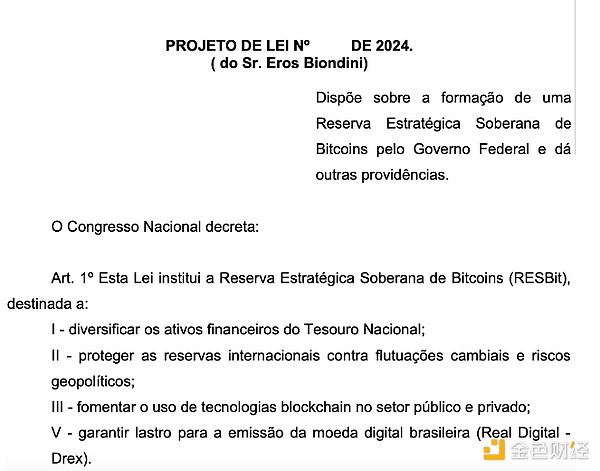
Author: Ana Paula Pereira, CoinTelegraph; Compiled by: Whitewater, Golden Finance
A bill recently introduced in the Brazilian Congress plans to establish a sovereign federal Bitcoin reserve, which may reshape the country’s Attitude towards digital assets.
The bill, proposed by Congressman Eros Biondini on November 25, aims to establish a sovereign strategic Bitcoin reserve called RESBit.
Under the legislation, Bitcoin reserves can protect the country’s sovereign reserves from currency fluctuations and geopolitical risks, while also serving as the currency for the country’s upcoming central bank digital currency “Real Digital” (Drex) of collateral.
Sovereign reserves are a pool of assets held by a central bank, typically used to support the country’s fiat currency, stabilize the economy, and support international trade. As of December 2023, Brazil had $355 billion in reserves, largely backed by assets pegged to global fiat currencies such as the U.S. dollar.
Under the proposed legislation, the Bitcoin reserve would supplement existing financial assets through phased purchases, up to a maximum of 5% of the country’s reserves. With the support of a technical advisory committee composed of security experts, the country’s central bank will still manage assets through a public system supported by blockchain and artificial intelligence technology.
Brazil’s RESBit Act. Source: House of Representatives
The bill cites El Salvador’s move to Bitcoin as an example of progress. The Central American country made Bitcoin a legal tender alongside the U.S. dollar in 2021, seeking to increase financial inclusion and encourage foreign investment.
Since then, El Salvador has been actively buying Bitcoin. As of November 26, El Salvador held nearly 6,000 Bitcoins worth US$542 million.
Bitcoin has helped El Salvador diversify its economy over the past four years, according to a draft law proposed by Brazil.
The bill also includes penalty provisions for RESBit violations or mismanagement, stating that violators may face administrative or criminal sanctions.
The legislation is currently under review by the Speaker of Brazil’s Chamber of Deputies and, once approved, will be submitted to committees for debate.
Brazil has been advancing guidelines for digital assets. In June 2023, the country implemented a legal framework giving the central bank the power to regulate and supervise virtual asset service providers. Additionally, tokens that qualify as securities continue to be regulated by the country’s Securities and Exchange Commission.













